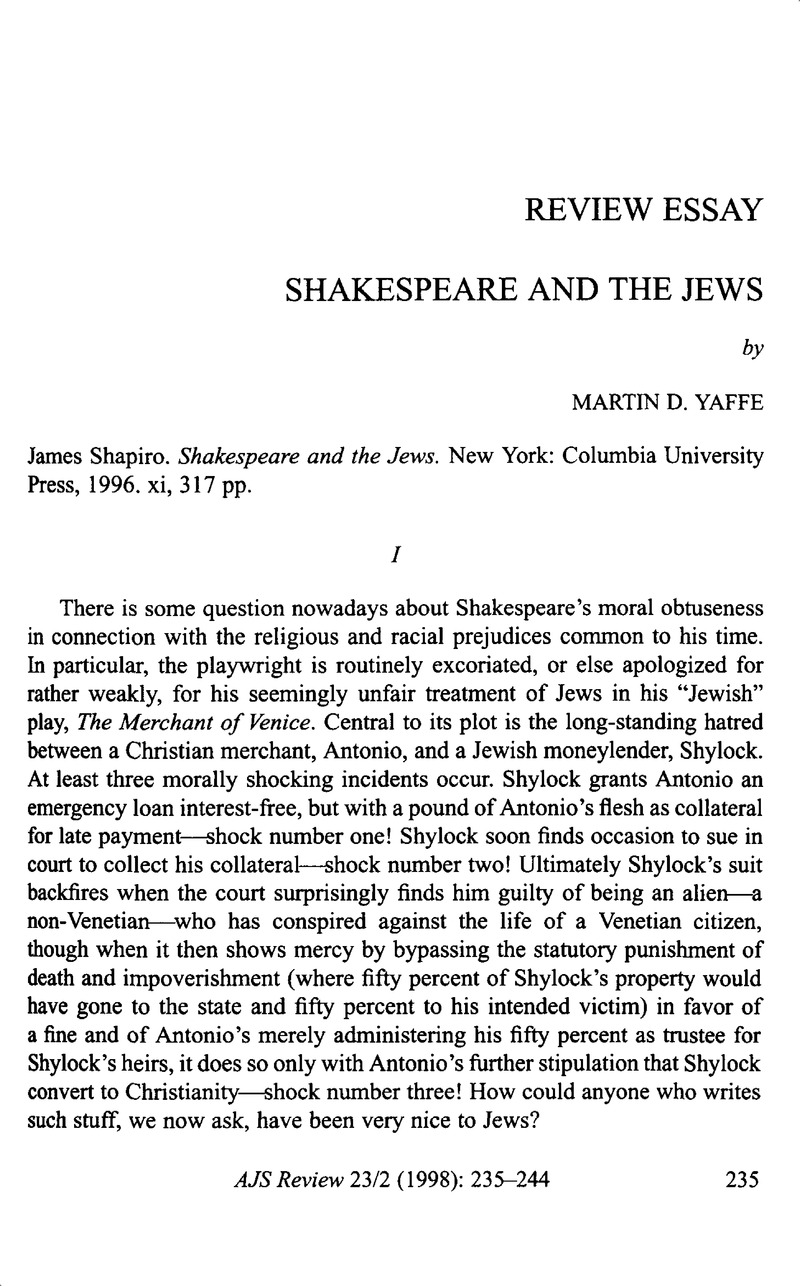No CrossRef data available.
Article contents
Published online by Cambridge University Press: 15 October 2009
Abstract

- Type
- Review Essay
- Information
- Copyright
- Copyright © Association for Jewish Studies 1998
References
1. In another context, however, Shapiro speaks of “Shakepeare's anti-Jewish play” (p. 221).
2. See The Merchant of Venice, ed. Kittredge, George Lyman, rev. Irving Ribner (New York: John Wiley, 1973), IV.i.344–90, with 1. 385 and, in particular, 11. 344–61: Tarry, Jew. The law hath yet another hold on you. It is enacted in the laws of Venice, If it be prov'd against an alien That by direct or indirect attempts He seeks the life of any citizen, The party 'gainst the which he doth contrive Shall seize one half his goods; the other half Comes to the privy coffer of the state; And the offender's life lies in the mercy Of the Duke only, 'gainst all other voice. In which predicament I say thou stand'st; For it appears by manifest proceeding That indirectly, and directly too, Thou hast contriv'd against the very life Of the defendant, and thou hast incurr'd The danger formerly by me rehears'd. Down, therefore, and beg mercy of the Duke. All subsequent references to the play will be to this edition.Google Scholar
3. For example, Shapiro reads Locke's statement in A Second Letter on Toleration that “only full naturalisation could direct the Jews of England towards Christ” to mean merely that its author wrote in the grip of the prevalent anti-Jewish prejudices (p. 204). Shapiro does not consider the likelihood that Locke was in full control of a statesmanlike rhetorical ploy. Consider, in this connection, the passage Shapiro cites next, from Locke's Paraphrase and Notes on St. Paul's Epistle to the Romans on Romans 11:23: “This grafting in again seems to import that the Jews shall be a flourishing nation again, professing Christianity in the land of promise, for that is to be reinstated again in the promise made to Abraham, Isaac and Jacob. This St. Paul might, for good reasons, be withheld from speaking out here; but, in the prophets there are very plain intimations of it” (p. 204, emphasis added). Locke's mention of Paul's possibly deliberate reticence (“for good reasons”) is itself rather reticent, in such a way as to suggest that Locke himself was perfectly acquainted with the practice of rhetorical ellipsis.
4. See, for example, p. 43, with p. 189 (“the play as a cultural safety-valve”) and p. 228 (“The Merchant's capacity to illuminate a culture”)
5. If so, the pro-Shylock sympathies of nineteenth- and twentieth-century actors and audiences would, to say the least, not be entirely without foundation in Shakespeare's text as understood by its author. Consider here the remark by Heminge and Condell in their introductory letter “To the Variety of Readers” in the Folio edition of 1623, that Shakespeare's “mind and hand went together.”
6. “I am interested here not only in restoring a sense of the fascination and importance circumcision held for Elizabethans but also in arguing that an occluded threat of circumcision informs Shylock's desire to cut a pound of Antonio's flesh.... Plays, unlike sermons, are not reducible to one lesson or another, nor do they gain their resonance from being about a recognizable central theme. Surely, in the hands of a talented dramatist, the less easily definable the social and psychological currents a play explores, the greater its potential to haunt and disturb. We return again and again to Shakespeare's plays because they seem to operate in these depths and tap into the roots of social contradictions on a stunningly regular basis, leaving critics with the task of trying to explain exactly what these are and how Shakespeare's plays engage them” (pp. 114, 121).
7. See the preceding note.
8. Thomas Aquinas, Summa theologiae II–II.35.4, with I–II.84.3–4
9. For a fuller statement, see Yaffe, Martin D., Shylock and the Jewish Question (Baltimore: Johns Hopkins University Press, 1997).Google Scholar




